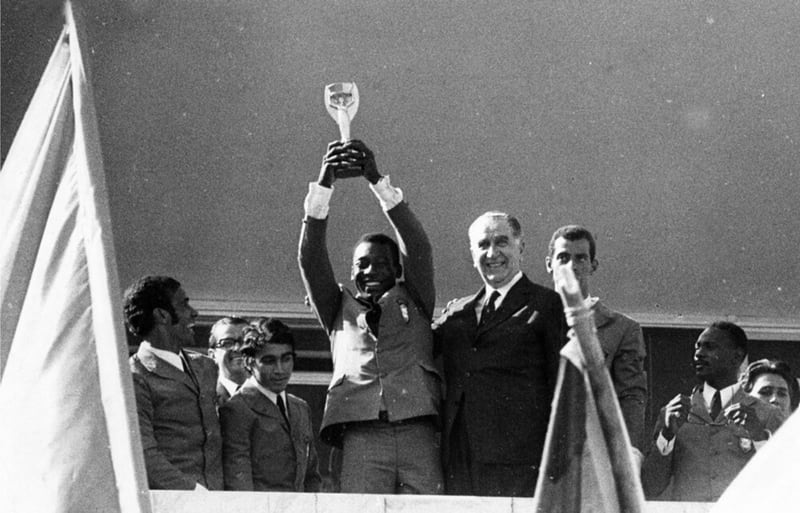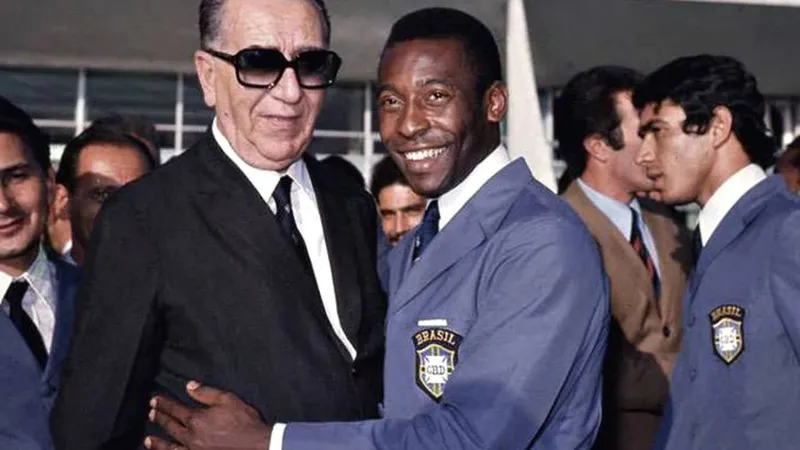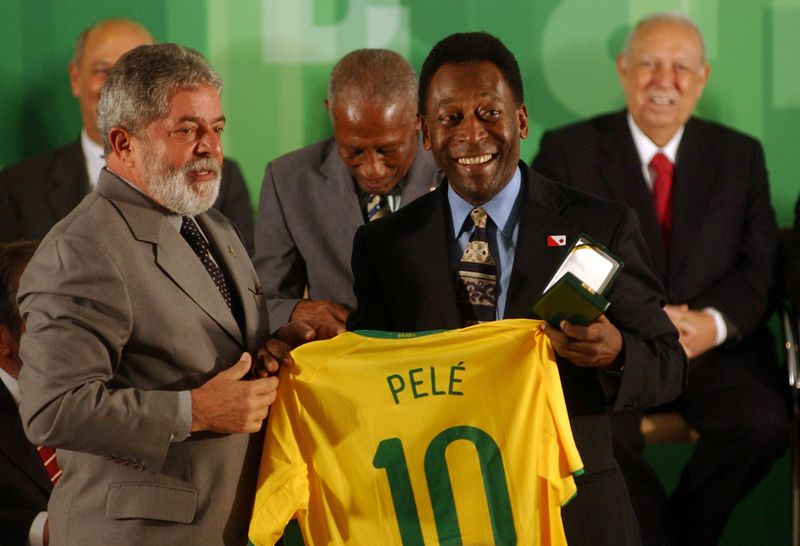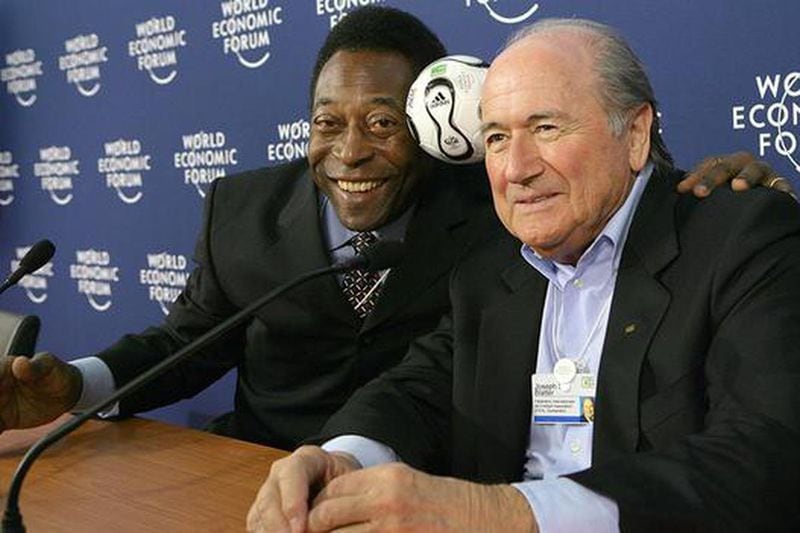The late Brazilian star never criticized governments and even attended events with some of his country’s dictators. Of course, he claimed that we wanted him to provide public support, which he never did.
Elite athletes are often on the front line. Beyond their rigorous disciplines, it is common for them to be associated with certain thoughts. Or that their figures escape from the margins of the field in which they evolve professionally. It is no mystery that Diego Armando Maradona or Muhammad Ali have become cultural figures either because of the devotion they arouse or because of their views on political issues.
In this sense, Pelé, the best football player of the 20th century, according to FIFA, had an opposite face. The Brazilian star has rarely expressed his position on social issues. Something that earned him more than one question. Edson Arantes do Nascimento has also been targeted due to his closeness to football’s governing body. Something that differentiated him, for example, from Maradona, who aimed his darts at football leaders.
It is common for characters’ world outlook to be known when they reach the peak of their performance. However, the three-time world champion has preferred to keep a quiet profile in this regard. A silence that has often complicated him.
Pelé and the dictatorship
On Tuesday, March 31, 1964, Brazilian President João Goulart was overthrown, triggering a military dictatorship that lasted from that year until 1985. Meanwhile, five uniformed officers held the highest office in the country. As expected, football was an element used by politics. As happened in Argentina in 1978.
At the time, O Rei became the top national idol. After the blow that meant the Maracanazo of 1950, the planetary titles of 1958 and 1962 made the people of the nation of samba, which was beginning to position itself as a formidable team in international competitions.
Pelé, the sensation, was at the height of his career. He went on tour with his club, Santos, doing shows all over the world. There was no footballer who didn’t know who the Scratch 10 was. However, this position of maximum referent never made him take sides despite the difficult times his region was going through.
In Mexico 1970, the cast led by Mario Zagallo on the bench and Edson Arantes on the pitch, conquered the world for the third time in their history. Until today, it is cataloged, by many, as the best selection of all time. Pure football is displayed on the lawn of the Azteca stadium, in an attack where the star was accompanied by Jairzinho, Gérson, Tostão and Rivelino. The same place that years later would see the best Maradona and that the singer Andrés Calamaro would immortalize in a song.
But, parallel to the coronation, Brazil suffered. Human rights violations and the murder of political opponents were elements that increased when the adviser to the military junta was Emílio Garrastazu Médici. The same one who received the champions on their return from North America. The very one with whom Pelé posed on more than one occasion, to the chagrin of many compatriots of the idol.

The contact between crack and the dictator begins before 70. Médici, designated as the most bloodthirsty of the dictatorship, used football to clean up his image. In the Netflix documentary “Pelé”, released in 2021, they reveal how the military went to the Maracanã every Sunday. In this context, he met Pelé after the star scored his thousandth goal, which came in 1969.
“They informed me that the president wanted to see me, congratulate me, and I went. They never forced me to do anything,” he said of it.
Regarding his relationship with the dictatorship, in the images, the Brazilian idol states that: “If I said I didn’t know about the torture, I would be lying. We learned a lot of things, but it also happened that we didn’t know if it was true or false. In Santos, we toured Europe and watched the news. How do you know if it was true or a lie? asked O Rei.
In any case, he acknowledged that: “I have always had open doors with governments. Everybody knows it. Even when things were going very badly. They always looked for me to support people on one side or the other.

Minister in Brazil, the Pelé law and its relationship with FIFA
Pelé’s attitude towards politics would never change. As the 2014 World Cup in Brazil approached and people demonstrated against the government of Dilma Rousseff, the former footballer came out to demand order when the World Cup is played. “We cannot mix football with these situations. This sport has promoted Brazil to the world and brought joy to its people. Corruption, problems and complaints have nothing to do with our team” said in the contest preview.
Sometimes it wasn’t smiles, but he had a few slights. One was with fellow countryman Joao Havelange, FIFA boss between 1974 and 1998. Pele accused Ricardo Teixeira, president of the Brazilian Football Confederation, of corruption in 1989 and 2012. who was the former swimmer’s son-in-law, leading to him breaking off their four-decade relationship. When this happened, Edson Arantes do Nascimento was Brazil’s sports minister. position he held for almost three years, under the presidency of Fernando Henrique Cardoso.

During his period of political trial and error, he promulgated the “Pelé law”. A status that improved the working conditions of footballers, which would further impact their contracts and remove power from the CBF.
Coming out of his differences with Havelange and Teixeira, with whom he would later settle his quarrels, coming to support him two decades later, Pelé never criticized FIFA’s ever-questioned efforts. Without going any further, in the midst of the FBI scandal, he evokes in good terms the former Chairman of the Board of Directors, Joseph Blatter. “I was in favor of his re-election, it needed an expert guy,” they said.

The demands were not well received by everyone. For example, Romario contradicted him with one of the most iconic phrases and which, perhaps, best represents the late star’s relationship with the world of politics. “Silent Pelé is a poet,” said the former striker.
After the resignation of the Swiss leader, Pelé backtracked, again without dwelling on it. “It takes us all by surprise… To organize anything you need good people and I want to see football unite people, stop wars. that’s my stance Because that’s what football does, unites people,” he said.
In his later years, Santos’ biggest idol had a few ties with Jair Bolsonaro. When the president was elected in 2018, the football star claimed he did not exercise his right to vote, but he wished him good government. “I didn’t vote because I was abroad, but I think it was well chosen. You have to support him so that everything goes well,” he said.
Two years later, when criticism of a right-wing politician was at its height, Pelé sent him an autographed jersey as a gift. “To President Bolsonaro, with a hug, Edson Pelé,” said the Santos jacket.
follow on Jock
Source: Latercera
I’m Scott Moore, a professional writer and journalist based in the US. I’ve been writing for various publications for over 8 years now, and have been working as an author at athletistic for the past five years. My work has been featured by some of the leading sports websites and magazines across Europe.


